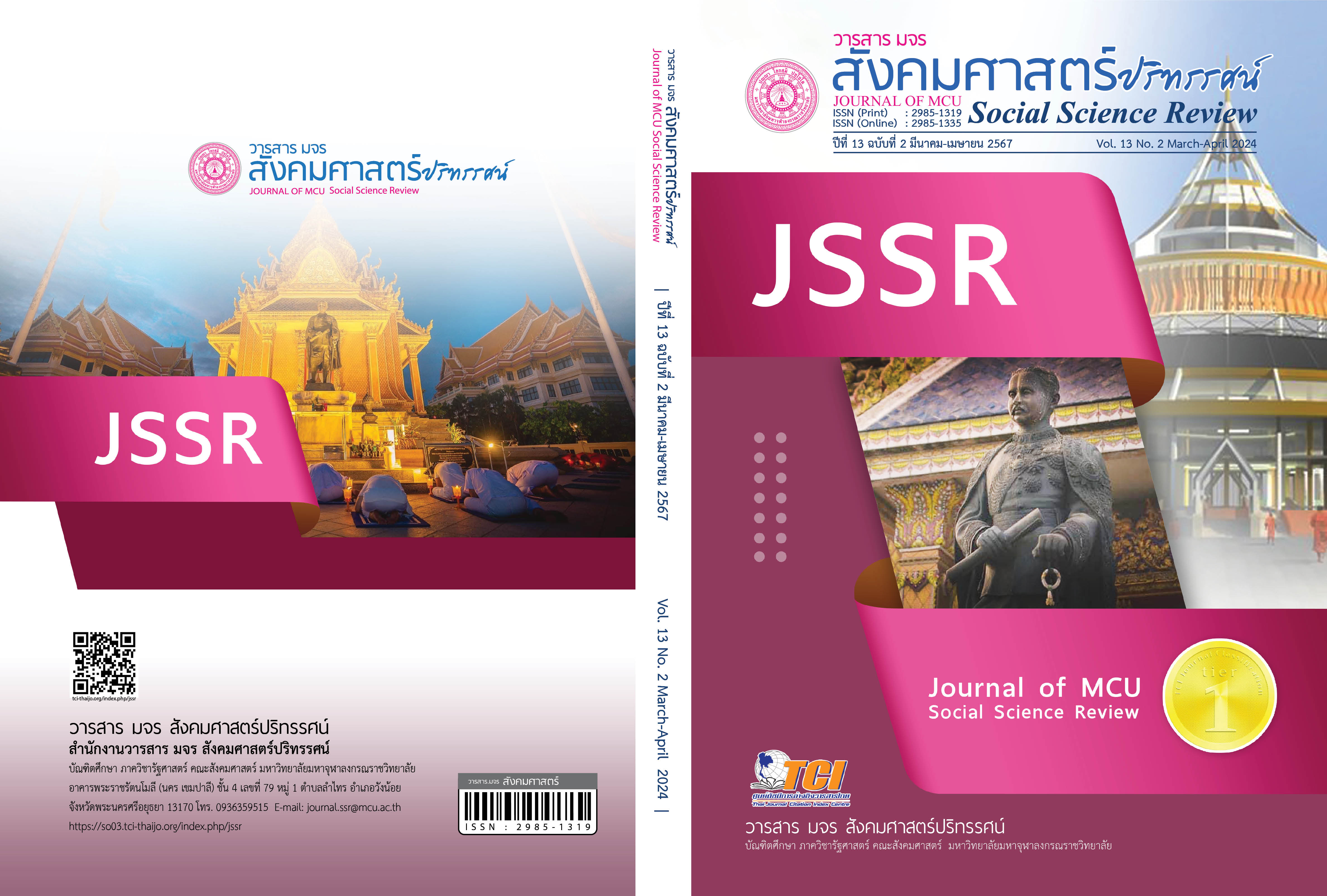วัฒนธรรมองค์การภาครัฐที่เหมาะสมกับยุคไทยแลนด์ 4.0 สำหรับองค์การภาครัฐในราชการบริหารส่วนกลาง
คำสำคัญ:
วัฒนธรรมองค์การ, องค์การภาครัฐ, ไทยแลนด์ 4.0บทคัดย่อ
บทความวิจัยนี้มีวัตถุประสงค์ 1. ศึกษาวัฒนธรรมองค์การและ 2. วิเคราะห์ส่วนประกอบวัฒนธรรมองค์การภาครัฐที่เหมาะสมกับยุคไทยแลนด์ 4.0 โดยใช้การวิจัยแบบผสมระหว่างการวิจัยเชิงคุณภาพซึ่งประกอบด้วยผู้ให้ข้อมูลหลัก จำนวน 14 ราย จาก 14 หน่วยงาน โดยการสัมภาษณ์กึ่งโครงสร้าง และยืนยันด้วยข้อมูลเชิงประจักษ์โดยการวิจัยเชิงปริมาณซึ่งใช้กลุ่มตัวอย่าง จำนวน 199 ราย จากองค์การภาครัฐในราชการบริหารส่วนกลาง โดยใช้แบบสอบถามแบบมาตรวัดประมาณค่า 5 ระดับซึ่งทวนสอบแล้วว่ามี IOC = 1 และ a = 0.971 และการวิเคราะห์ตัวประกอบเชิงยืนยัน (CFA) ด้วยโปรแกรมวิเคราะห์โมเดลสมการโครงสร้าง (SEM)
ผลการวิจัยพบว่า วัฒนธรรมองค์การภาครัฐที่เหมาะสมกับยุคไทยแลนด์ 4.0 ประกอบด้วย 5 ส่วนประกอบหลัก และ 39 ส่วนประกอบย่อย ได้แก่ 1) มโนทัศน์จากยุทธศาสตร์การปฏิวัติอุตสาหกรรมครั้งที่ 4 มีส่วนประกอบย่อย 4 ส่วน 2) มโนทัศน์จากโมเดลไทยแลนด์ 4.0 มีส่วนประกอบย่อย 5 ส่วน 3) มโนทัศน์จากระบบราชการ 4.0 มีส่วนประกอบย่อย 6 ส่วน 4) วัฒนธรรมการทำงานที่ดีตามเกณฑ์คุณภาพการบริหารจัดการภาครัฐ PMQA 4.0 มีส่วนประกอบย่อย 7 ส่วน และ 5) ค่านิยมหลักและมโนทัศน์ที่เอื้อต่อการเป็นองค์การสมรรถนะสูงและองค์การแห่งความเป็นเลิศ มีส่วนประกอบย่อย 17 ส่วน ซึ่งสามารถนำไปประยุกต์ใช้ในการปรับวัฒนธรรมองค์การภาครัฐให้สอดคล้องกับยุคไทยแลนด์ 4.0 ได้
เอกสารอ้างอิง
Bentler, P. M., & Chou, C. P. (1987). Practical issues in structural equation modeling. Sociological Methods and Research, 16(1), 78–117.
Boonmatat, S. (2019). Organizational Culture Suited for Thailand 4.0 Era: Cultural Elements Fostering the Improvement of Organizational Performance. Journal of Economics and Management Strategy, 6(2), 159-175.
Burke, W. W. (2014), Organization Change: Theory and Practice. California: SAGE.
Byrne, B. M. (2016). Structural equation modeling with AMOS: basic concepts, applications, and programming (3rd ed). New York: Routledge.
Chandarasorn, V. (2019). National Strategy and Implementation. Presented to the Conference of Royal Institute Members. Bangkok: Office of the Royal Society.
Creswell, J. W., & Creswell, J. D. (2018). Research Design (5th Edition). California: SAGE.
EFQM. (2013). EFQM Excellence Model. Belgium: EFQM.
Federal Ministry for Economic Affairs and Energy. (2018). Platform Industrie 4.0. Berlin: Public Relation Division.
Gibson, J. L., et al. (2012). Organizations: Behavior, Structure, Processes. New York: McGraw-Hill.
Hair, J. F. et al. (2019). Multivariate Data Analysis (8th ed). United Kingdom: Cengage Learning.
Industrial Value Chain Initiatives. (2018). IVRA Next. Tokyo: Monodukuri Nippon.
Kane, G. C., et al. (2019). The Technology Fallacy: How People Are the Real Key to Digital Transformation. US: MIT Press.
Digital transformation. (2016). Seven steps to success. Retrieved March 20, 2022, from https://shorturl.asia/n5LR4
National Institute of Standards and Technology (NIST). (2017). Baldrige Excellence Framework: A systems approach to improving your organization’s performance, 2017-2018. USA: United States Department of Commerce.
Nunnally, J. C. (1978). Psychometric theory (2nd ed.). New York: McGraw-Hill.
Office of the Civil Service Commission. (2018). Strategic Action Plan for Establishing and Developing Public Human Resource toward Digital Thailand (B.E. 2561-2565). Retrieved March 20, 2021, from https://www.ocsc.go.th/node/5280
Office of the Public Sector Development Commission. (2018). Thailand 4.0 - Bureaucracy 4.0. Retrieved March 20, 2021, from https://www.opdc.go.th
_____. PMQA 4.0 (2019). Retrieved March 20, 2021, from http://www.opdc.go.th
Polit, D. F., & Beck, C. T. (2006). The Content Validity Index: Are You Sure You Know What’s Being Reported? Critique and Recommendations. Research in Nursing & Health, 29(5), 489-497.
Rovinelli, R. J., & Hambleton, R. K. (1977). On the use of content specialists in the assessment of criterion-referenced test item validity. Dutch Journal of Educational Research, 2, 49-60.
Schein, E. H. (2017). Organizational Culture and Leadership (5th ed). New Jersey: John Wiley & Sons.
Schwab, K. (2016). The Fourth Industrial Revolution World Economic Forum. UK: Penguin Random House.
Department of Local Administration Promotion. (2016). Thailand 4.0, a model that drives Thailand towards stability, prosperity and sustainability. Retrieved April 13, 2019, from https://shorturl.asia/SjaO7
ดาวน์โหลด
เผยแพร่แล้ว
รูปแบบการอ้างอิง
ฉบับ
ประเภทบทความ
สัญญาอนุญาต
ลิขสิทธิ์ (c) 2024 วารสาร มจร สังคมศาสตร์ปริทรรศน์

อนุญาตภายใต้เงื่อนไข Creative Commons Attribution-NonCommercial-NoDerivatives 4.0 International License.
เพื่อให้เป็นไปตามกฎหมายลิขสิทธิ์ ผู้นิพนธ์ทุกท่านต้องลงลายมือชื่อในแบบฟอร์มใบมอบลิขสิทธิ์บทความให้แก่วารสารฯ พร้อมกับบทความต้นฉบับที่ได้แก้ไขครั้งสุดท้าย นอกจากนี้ ผู้นิพนธ์ทุกท่านต้องยืนยันว่าบทความต้นฉบับที่ส่งมาตีพิมพ์นั้น ได้ส่งมาตีพิมพ์เฉพาะในวารสาร มจร สังคมศาสตร์ปริทรรศน์ เพียงแห่งเดียวเท่านั้น หากมีการใช้ภาพหรือตารางหรือเนื้อหาอื่นๆ ของผู้นิพนธ์อื่นที่ปรากฏในสิ่งตีพิมพ์อื่นมาแล้ว ผู้นิพนธ์ต้องขออนุญาตเจ้าของลิขสิทธิ์ก่อน พร้อมทั้งแสดงหนังสือที่ได้รับการยินยอมต่อบรรณาธิการ ก่อนที่บทความจะได้รับการตีพิมพ์ หากไม่เป็นไปตามข้อกำหนดเบื้องต้น ทางวารสารจะถอดบทความของท่านออกโดยไม่มีข้อยกเว้นใดๆ ทั้งสิ้น





